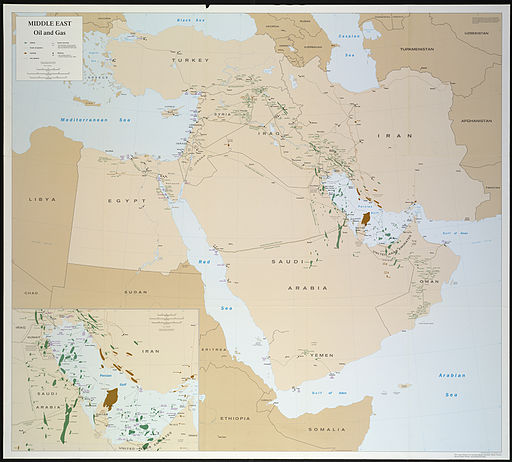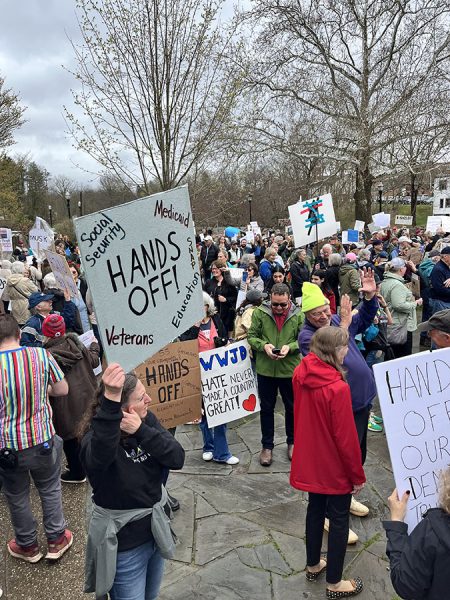Intervention Will Not Prevent Terror

This 1993 CIA map depicts Middle East oil and gas reserves. Source: CIA via Wikimedia Commons.
Anarchy swept the city of Paris, France on Nov. 19 as a series of coordinated terrorist attacks by the Islamic radical group ISIS left 130 people dead and 368 wounded, according to The Guardian.
On Dec. 2, a married Muslim couple, armed with semi-automatic weapons, opened fire on a group of county health workers in San Bernardino, Calif., killing 14, wounding 23 and turning the guns on themselves. This shooting, too, was apparently inspired by ISIS, with the organization itself describing the couple as “supporters” of their cause.
Americans are forced to rally, once again, to confront an enemy that has attacked within our own borders.
“Our success will not depend on tough talk or abandoning our values or giving in to fear,” President Barack Obama said in a Dec. 5th address from the Oval Office. “Instead, we will prevail by being strong and smart, resilient and relentless.”
These horrifying events also brought Middle East instability to the forefront of issues in the 2016 Presidential Election.
Candidates from both sides of the political spectrum claim they have their own plans to put in place, if elected. But would any of them actually work?
In a Nov. 19 speech, Democratic candidate and former Secretary of State Hillary Clinton advocated a no-fly zone over Syria, along with an intensified number of air strikes on areas controlled by ISIS. She voiced her opposition to the deployment of U.S. ground troops to Syria, even in the event of a terrorist attack on American soil.
She noted that, if elected, she would be willing to open U.S. borders to an additional 55,000 Syrian refugees, increasing the total number of refugees to 65,000. This is the morally upstanding thing to do, but might not be politically savvy, given the circumstances.
Paranoia about infiltration of the U.S. by terror groups is at an all-time high after one of the Paris bombers reportedly entered Europe with a Syrian passport.
31 governors have said they don’t intend to allow refugees into their states. These statements only fuel the xenophobia of the electorate.
U.S. Sen. Bernie Sanders, also seeking the Democratic nomination, agreed with Clinton, stating the U.S. should combat ISIS with the help of a broad coalition including Western and regional Islamic powers. Sanders warned against the George W. Bush administration’s mistake of sending ground troops too quickly into the region.
These are pragmatic proposals that would do much to stop the spread of ISIS influence in the region.
However, the plans proposed by the Republican candidates lack such realism.
Donald Trump, echoing others in his party, has admitted that if elected, he would consider sending 10,000 troops to the region, shutting down mosques in the United States and, along with candidate Dr. Ben Carson, would consider bringing back waterboarding as a way of extracting intel from prisoners.
He also recently proposed blocking the entry of all Muslims into the United States, an idea which violates the First Amendment.
No matter how ISIS is dealt with, one thing is clear: It would be disastrous if the U.S. repeated the same mistakes we have made historically in the Middle East, most recently in the Iraq War, but also in other cases from Iran in the 1950s to post-9/11 Afghanistan.
Republican proposals would result in a never-ending cycle feeding back into radical Islamic hatred for the U.S. and fueling the formation of more radical Islamic terrorist groups.
That will not happen, unfortunately, until the U.S. finds another source for the 12.9% of our crude oil that is currently imported from the Middle East.
This might not seem like a large percentage when compared to the perception, but this still represents over one-eighth of the oil supply.
The cases mentioned above were obviously fueled by U.S. thirst for oil, as instability and weakened American influence in the region usually result in higher oil and gas prices, as seen during the mid-1970s oil crisis.
It is important that we solve this issue, because freeing ourselves from a dependence on Middle Eastern oil would mean that we could finally stop taking such interest in a region of the world that is, most of the time, clearly not very pro-American, and most likely will not be for awhile.
The trend seems to be that the more we intervene, the more momentum is given to extremist groups such as ISIS.
If we reach this point and withdraw from the region, only intervening when it is absolutely necessary (the situation with ISIS falls under this umbrella), with time, we can begin to heal our relationship with the Middle East, ushering in a new era of cooperation based on true friendship, not just mutual interest.

Alex Cala has been writing for The Beachcomber since the fall of 2014, when he was a sophomore. He became the opinion editor the following year. Alex tends...











